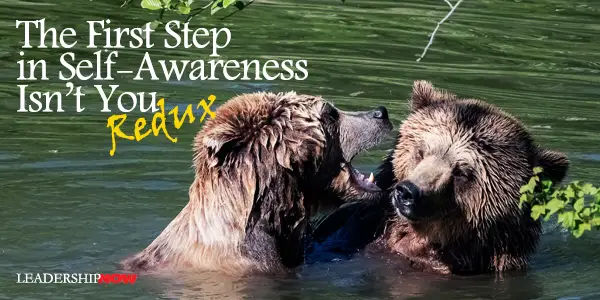 |
 |
05.13.13

The First Step in Self-Awareness Isn’t You - Redux
HUMAN BEINGS—and that includes most leaders—are relational. Self-leadership is fundamental to good leadership, but it is not the end-game. Self-awareness for self-awareness sake has limited value. Through introspection and reflection we can get to know a great deal about ourselves—as far as we know. The problem is that we don't know what we don't know. Only when we are able to test our assumptions about ourselves, can we know if we are getting it right. It is when we see ourselves in relation to others and in relation to a higher purpose that we really begin to clarify (and many times even identify) our core values, beliefs and intentions. We can all know who we think we are, but it isn't until we get out and interact with others that we can begin to see where we are right and where we have been fooling ourselves. Who we are takes on meaning when it is in the context of our relationship with others. Superman's stance on "truth, justice, and the American Way" is pointless if he remains isolated in his Fortress of Solitude. His values only have meaning in relationship to other people. All the self-knowledge in the world counts for very little if it is not put to work in the service of others. Self-awareness that points to your unique contribution in the world is leadership. Who you are is leveraged when it is placed in the service of other people. Surely we must lead with integrity—in a manner consistent with who we are. However, the only way to know if we are really doing that is by looking at how we impact the lives of others—how our leadership is experienced by others. Self-awareness provides the opportunity for us to close the gap between who we think we are or want to be and who we actually are at a particular point in time. But that can only be achieved with feedback of some kind. I want to share a lengthy story provided by Scott Weiss in his great book DARE, to illustrate this point. It's a book about trust in leadership and the trust that is generated by knowing who you are and leading as that person. At thirty-five, I was already an executive vice president with Turner Broadcasting, overseeing two divisions and reporting directly to the second most senior executive who soon would be named the company's CEO. I believed that I was very much at the top of my game, already delivering a lot of high-level presentations, and getting consistently positive feedback. I was more than a little offended by the suggestion that I needed any help at all with my communication skills. But I went. I appreciate Scott Weiss sharing this story, for it's not just a process all growth-oriented leaders must go through, but a process we must seek out continuously. Feedback is a process that, if we allow it, will keep us honest with ourselves. We see things as we are, and we see ourselves through our intentions. Feedback gives us a reality check that we are free to accept or reject, but without it we have no way to combat our own self-deception. We must be able to experience ourselves in relation to other people if we are to have a genuine understanding of who we are and why we do what we do. So the place to begin if we truly want to know ourselves is to reflect on the impact that we have on others. Only then can we lead authentically knowing that our inner being is congruent with our outer behavior.
Posted by Michael McKinney at 12:09 AM
|
BUILD YOUR KNOWLEDGE
 

How to Do Your Start-Up Right STRAIGHT TALK FOR START-UPS 
Grow Your Leadership Skills NEW AND UPCOMING LEADERSHIP BOOKS 
Leadership Minute BITE-SIZE CONCEPTS YOU CAN CHEW ON 
Classic Leadership Books BOOKS TO READ BEFORE YOU LEAD |